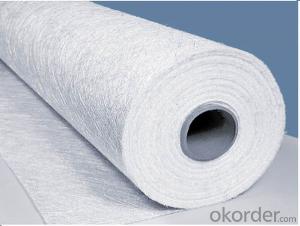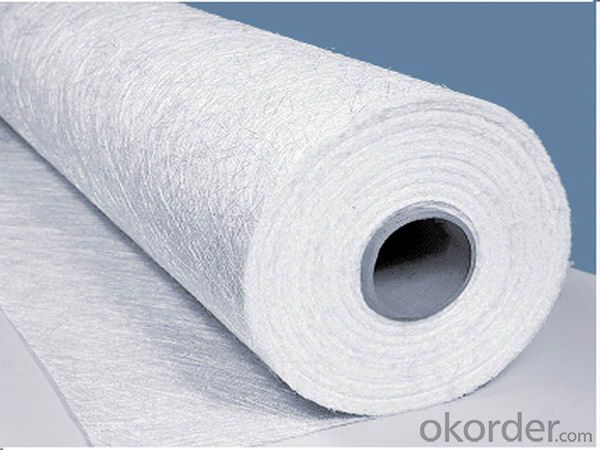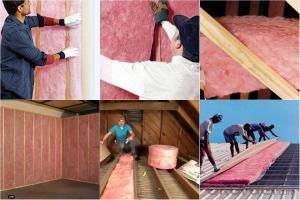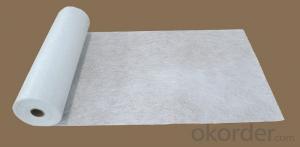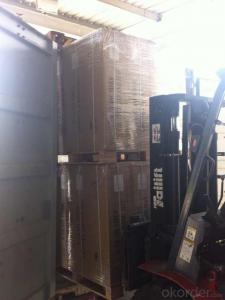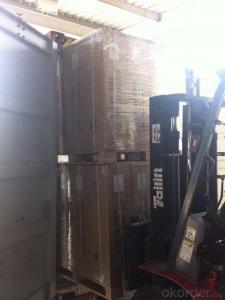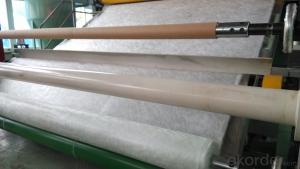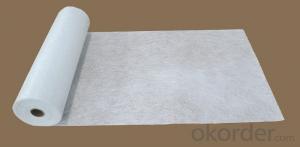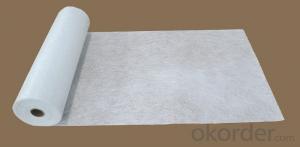Fiberglass Mat Tissue E-Glass Fiber Chopped Strand Mat Emulsion Bonded
- Loading Port:
- Shanghai
- Payment Terms:
- TT or LC
- Min Order Qty:
- 20000 kg
- Supply Capability:
- 200000 kg/month
OKorder Service Pledge
OKorder Financial Service
You Might Also Like
1.Brief Introduction
E-Glass Emulsion Chopped Strand Mat is made of randomly distributed chopped strands held tighter by a emulsion binder. It is compatible with UP, VE, EP resins.
It is compatible with UP, VE, EP, PF resins.
Additional demands on wet-out and decomposition time may be available upon request.
It is designed for use in hand lay-up, filament winding, compression molding and continuous laminating processes. Its end-use applications include boats, bath equipment, automotive parts, chemical corrosion resistant pipes, tanks, cooling towers and building components
2.Product Features
Fast breakdown in styrene
High tensile strength, allowing for use in hand lay-up process to produce large-area parts
Good wet-through and fast wet-out in resins, rapid air lease
Superior acid corrosion resistance
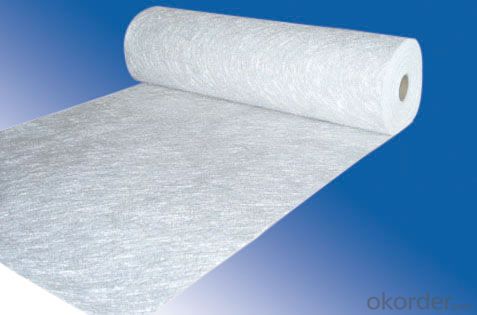
3. Product Specifications
Fiber type: E-glass
Unit weigth:100g/m2 150g/m2 200g/m2 220g/m2
Binding type: Powder or Emulsion;
Roll width: 50mm-3300mm
Roll weight:30kg/roll
4.FAQ
Packaging:
Each Chopped Strand Mat is wound onto a paper tube which has an inside diameter of 76mm and the mat roll has a diameter of 275mm. The mat roll is wrapped up with plastic film,and then packed in a cardboard box or wrapped up with kraft paper. The rolls can be vertically or horizontally placed. For transportation, the rolls can be loaded into a container directly or on pallets.
Storage:
Unless otherwise specified, Chopped Strand Mat should be stored in a dry, cool and rain-proof area. It is recommended that the room temperature and humidity should be always maintained at 15℃~35℃ and 35%~65% respectively.
- Q: How does the weight of fiberglass mat tissue affect its performance?
- The performance of fiberglass mat tissue is significantly affected by its weight. The weight of the tissue indicates the amount of glass fibers per unit area. Generally, a higher weight indicates a greater concentration of fibers, which results in improved strength and durability. To begin with, a heavier fiberglass mat tissue provides better tensile strength. The increased number of fibers in the tissue enables it to withstand higher levels of stress and strain without breaking or tearing. This makes it ideal for applications that require a high load-bearing capacity, such as structural components in the construction or automotive industries. Additionally, the weight of the tissue also impacts its stiffness and rigidity. A heavier mat tissue offers better dimensional stability, meaning it will maintain its shape and form even when subjected to external forces. This is crucial in applications where the material needs to retain its structural integrity, such as in boat hulls or wind turbine blades. Moreover, the weight of the fiberglass mat tissue affects its thermal and acoustic insulation properties. A higher weight is usually associated with better insulation capabilities, as the increased fiber density enhances the material's ability to trap air and reduce heat transfer or sound transmission. This makes it suitable for applications that require effective insulation, such as in buildings or industrial equipment. Finally, the weight of the fiberglass mat tissue can impact how easily it can be handled and installed. A lighter tissue may be more flexible and easier to manipulate, making it simpler to fit into complex shapes or tight spaces. Conversely, a heavier tissue might require additional support or equipment during installation. In conclusion, the weight of fiberglass mat tissue has a direct influence on its performance characteristics, including tensile strength, rigidity, insulation properties, and ease of handling. Therefore, it is crucial to consider the intended application and the desired performance requirements when selecting the appropriate weight of fiberglass mat tissue.
- Q: Can fiberglass mat tissue be used for aerospace applications?
- Yes, fiberglass mat tissue can be used for aerospace applications. It is commonly used as a reinforcing material in the aerospace industry due to its excellent mechanical properties, such as high strength-to-weight ratio and resistance to corrosion. Additionally, fiberglass mat tissue can provide thermal insulation and fire resistance, making it suitable for various aerospace components, including aircraft interiors, panels, and structural parts.
- Q: Can fiberglass mat tissue be used for waterproofing?
- Indeed, fiberglass mat tissue has the potential to be utilized for waterproofing purposes. This particular material, comprised of fiberglass fibers, takes the form of a thin, non-woven substance. Its primary function lies in the reinforcement and provision of waterproofing attributes within the realm of construction and building applications. When combined with a waterproofing agent or resin, the fiberglass mat tissue can establish an impermeable barrier, effectively impeding the infiltration of water or moisture. Consequently, it proves to be a highly advantageous option for various undertakings such as roofing, basement waterproofing, and the installation of bathrooms or showers. Furthermore, the robustness and enduring nature of fiberglass mat tissue contribute to its resistance against cracks or tears, guaranteeing the longevity of its waterproofing capabilities.
- Q: Can fiberglass mat tissue be used for making lightweight countertops?
- Indeed, lightweight countertops can be crafted using fiberglass mat tissue. This particular material, derived from delicate glass fibers, possesses the desirable qualities necessary for producing lightweight countertops. Not only does it offer robustness and longevity, but it is also pliable and can be effortlessly shaped and sized to fit various specifications. Moreover, fiberglass mat tissue possesses resistance to moisture, chemicals, and heat, rendering it a fitting choice for countertops that may encounter such elements. In conclusion, utilizing fiberglass mat tissue to fabricate lightweight countertops proves to be a pragmatic and effective resolution.
- Q: Is fiberglass mat tissue resistant to termites and insects?
- No, fiberglass mat tissue is not resistant to termites and insects.
- Q: Can fiberglass mat tissue be used for repairing fiberglass boats?
- Yes, fiberglass mat tissue can be used for repairing fiberglass boats. Fiberglass mat tissue is a versatile material that is commonly used in repairing and reinforcing fiberglass structures, including boats. It is designed to provide strength and durability, making it an ideal choice for patching holes, cracks, or damaged areas in fiberglass boat hulls. The mat tissue is typically layered with resin to form a solid and stable repair, ensuring that the boat remains structurally sound. Additionally, fiberglass mat tissue is easy to work with and can be cut to the desired size and shape, making it suitable for various repair applications on fiberglass boats.
- Q: What are the different types of resins compatible with fiberglass mat tissue?
- Fiberglass mat tissue can be used with various types of resins. These resins, including polyester resin, epoxy resin, vinyl ester resin, and polyurethane resin, offer different properties and benefits. Polyester resin is widely used in fiberglass mat applications due to its cost-effectiveness and good mechanical properties. It is suitable for a wide range of applications and provides resistance to water and chemicals. Working with polyester resin is also easy. Another popular choice is epoxy resin, which offers excellent mechanical properties, high strength, and resistance to chemicals and moisture. It is commonly used in industries that require superior strength and durability, such as aerospace and marine industries. Vinyl ester resin is a hybrid resin that combines the best properties of polyester and epoxy resins. It offers high strength, good corrosion resistance, and excellent durability. This resin is commonly used in applications that require high chemical resistance and superior mechanical properties. Polyurethane resin is a versatile option that can be used with fiberglass mat tissue. It provides excellent flexibility, impact resistance, and adhesion properties. This resin is often used in applications that require high flexibility and resistance to abrasion, such as automotive parts and sporting goods. Ultimately, the selection of the resin depends on specific application requirements, including mechanical properties, chemical resistance, flexibility, and cost.
- Q: How is fiberglass mat tissue used in the production of water tanks?
- Fiberglass mat tissue, a type of non-woven fabric made from glass fibers, is commonly used in the production of water tanks due to its excellent strength, durability, and resistance to corrosion. Water tanks are typically made from fiberglass reinforced plastic (FRP), which is a composite material consisting of a polymer matrix reinforced with fiberglass. The fiberglass mat tissue plays a crucial role in this process as it serves as the reinforcement material. Firstly, the fiberglass mat tissue is cut into the desired shape and size to fit the mold of the water tank. It is then layered onto the mold, with the number of layers depending on the required strength and thickness of the tank. Once the fiberglass mat tissue is in place, a resin matrix is applied to impregnate and bind the fibers together. This resin can be polyester, vinyl ester, or epoxy, depending on the specific requirements of the water tank. The resin is typically applied using a spray or a roller, ensuring that it thoroughly saturates the fiberglass mat tissue. This process is often repeated multiple times to build up the necessary thickness and strength of the tank. After the resin has cured, the fiberglass mat tissue and resin composite becomes rigid and forms the structure of the water tank. The resulting FRP tank is lightweight, yet incredibly strong and durable, making it an ideal choice for storing and transporting water. The use of fiberglass mat tissue in water tank production provides several advantages. Firstly, it enhances the structural integrity of the tank, allowing it to withstand external forces such as pressure and impact. Secondly, fiberglass is highly resistant to corrosion, ensuring that the tank remains in good condition even when exposed to harsh environmental conditions or corrosive substances present in the water. Overall, fiberglass mat tissue is a critical component in the production of water tanks, providing strength, durability, and corrosion resistance, making it a reliable choice for various industrial, commercial, and residential applications.
- Q: What are the properties of fiberglass mat tissue?
- Fiberglass mat tissue, also known as fiberglass mat or fiberglass matting, is a type of non-woven material made from glass fibers. It possesses several properties that make it suitable for various applications. 1. Strength and durability: Fiberglass mat tissue is known for its high tensile strength, which means it can withstand significant amounts of stress without breaking. This property makes it ideal for reinforcing and strengthening different materials and structures. 2. Lightweight: Despite its strength, fiberglass mat tissue is relatively lightweight, making it easy to handle and transport. This property is particularly advantageous in industries where weight reduction is important, such as aerospace and automotive. 3. Flexibility: Fiberglass mat tissue is flexible, which allows it to conform to curved surfaces and complex shapes. This property makes it versatile and suitable for applications where the material needs to be molded or formed into specific designs. 4. Chemical resistance: Fiberglass mat tissue has excellent resistance to various chemicals, including acids, alkalis, and most solvents. This property makes it suitable for applications in corrosive environments, such as chemical processing plants or storage tanks. 5. Thermal insulation: Fiberglass mat tissue has good thermal insulation properties, meaning it can help to reduce heat transfer. This property makes it useful in applications where heat insulation is required, such as in the construction of walls, roofs, or insulation boards. 6. Fire resistance: Fiberglass mat tissue is inherently fire-resistant and does not contribute to the spread of flames. This property makes it widely used in applications where fire safety is essential, such as in the production of fire-resistant doors, panels, or insulation materials. 7. Sound insulation: Fiberglass mat tissue also offers good sound insulation properties, reducing noise transmission through walls or other structures. This property makes it suitable for use in soundproofing applications, such as in recording studios or automotive interior panels. Overall, the properties of fiberglass mat tissue make it a versatile material with a wide range of applications in various industries, including construction, automotive, aerospace, and marine. Its strength, flexibility, lightweight, chemical resistance, thermal and sound insulation properties, as well as its fire resistance, contribute to its popularity and usefulness in many different applications.
- Q: Can fiberglass mat tissue be used in automotive applications?
- Automotive applications can indeed make use of fiberglass mat tissue. This lightweight fabric, comprised of fine glass fibers, is frequently employed in the automotive industry for a range of purposes. These include reinforcing composite materials, enhancing mechanical properties, and decreasing weight. When it comes to automotive applications, fiberglass mat tissue is often utilized in the manufacture of fiberglass-reinforced plastics (FRP) components. These components encompass body panels, interior trim parts, engine covers, and various structural elements. By incorporating fiberglass mat tissue as a reinforcement layer during the production process, the strength, stiffness, and impact resistance of these components can be improved. Moreover, fiberglass mat tissue plays a vital role in reducing the weight of automotive parts while maintaining their structural integrity. This is of particular significance within the automotive industry, as reducing the weight of vehicles can result in heightened fuel efficiency and reduced emissions. In addition, fiberglass mat tissue boasts exceptional corrosion resistance, rendering it suitable for automotive applications that involve exposure to moisture, chemicals, and harsh environmental conditions. All in all, fiberglass mat tissue is a versatile material that can be effectively employed in a myriad of automotive applications. Its usage can enhance performance, reduce weight, and improve durability.
Send your message to us
Fiberglass Mat Tissue E-Glass Fiber Chopped Strand Mat Emulsion Bonded
- Loading Port:
- Shanghai
- Payment Terms:
- TT or LC
- Min Order Qty:
- 20000 kg
- Supply Capability:
- 200000 kg/month
OKorder Service Pledge
OKorder Financial Service
Similar products
Hot products
Hot Searches
Related keywords
